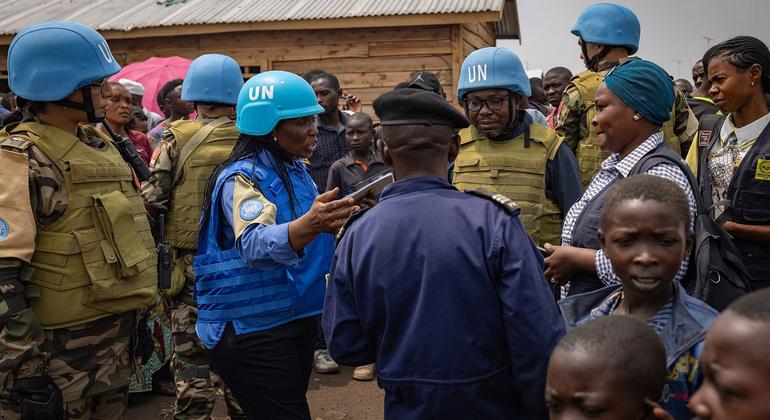The Democratic Republic of Congo (DRC) is currently facing a humanitarian crisis of epic proportions, with dead bodies littering the streets, hospitals overwhelmed, and reports of sexual violence, rape, and looting on the rise. The situation has become so dire that even essential services such as electricity, water, and internet have been compromised, leaving the population in a state of grave danger and uncertainty.
Shelley Thakral, spokesperson for the UN World Food Programme (WFP), described the harrowing conditions on the ground, stating, “Roads are blocked, ports are closed and those crossing Lake Kivu risk their lives in makeshift boats.” The sense of desperation and fear is palpable, as Thakral recounted a conversation with an activist in Goma who expressed uncertainty about whether help would arrive in time to save them.
The UN aid coordination office, OCHA, has expressed deep concerns about the escalating violence in the resource-rich region, which has resulted in the displacement of over 300,000 people from camps around Goma in a matter of days. Reports of heavy small arms and mortar fire, as well as the presence of dead bodies in the streets, have painted a grim picture of the devastation wrought by the conflict.
The situation has left hospitals in Goma overwhelmed by the influx of wounded individuals, with critical supplies and services severely lacking. The absence of internet services has further isolated the population, cutting them off from vital communication channels and information sources. The international community, including the UN Security Council, has issued urgent calls for an immediate halt to the violence and for the M23 rebel group to withdraw from seized territories.
The Security Council has reaffirmed its support for the UN peacekeeping force in the DRC, known as MONUSCO, and paid tribute to the peacekeepers who have lost their lives in recent days. The presence of external forces, particularly Rwandan troops allegedly involved in the offensive, has drawn condemnation from the Council, which has called for all parties to adhere to the ceasefire and engage in diplomatic negotiations to resolve the crisis.
The current escalation in violence in eastern DRC’s Kivus region is just the latest chapter in a long history of conflict and instability that has plagued the country for years. Prior to this recent outbreak of violence, an estimated 5.1 million people had already been displaced by the ongoing insecurity in the mineral-rich region, living in overcrowded camps with limited access to food and security.
UN agencies and humanitarian partners are closely monitoring the rapidly deteriorating situation, with WFP forced to temporarily suspend food assistance activities in and around Goma due to the violence. The cutting off of major access roads and the airport has severely impacted the delivery of essential supplies, leaving many vulnerable individuals at risk of starvation and deprivation.
As the crisis continues to unfold, the next 24 hours are critical for the people trapped in Goma and surrounding areas, as they run low on supplies and struggle to survive amidst the chaos and violence. The need for swift and decisive action from the international community to provide assistance and protection to those affected by the conflict has never been more urgent.
In addition to the immediate threats posed by the violence and displacement, there are also concerns about the potential spread of disease in overcrowded and unsanitary conditions. With hospitals overwhelmed and basic services compromised, the risk of a public health crisis looms large over the already vulnerable population.
The humanitarian crisis in the DRC is a stark reminder of the urgent need for sustained international support and solidarity in addressing the root causes of conflict and instability in the region. As the situation continues to deteriorate, the lives and well-being of millions of people hang in the balance, dependent on the swift and effective response of the global community to provide aid and protection in their time of greatest need.









